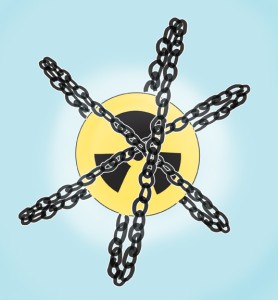Stanford’s Center for International Security and Cooperation (CISAC) received a $2.45 million grant for a span of four years from The John D. and Catherine T. MacArthur Foundation to train future specialists in nuclear security and support ongoing projects, including scientific cooperation with China.
Mariano-Florentino Cuéllar, law professor and CISAC co-director, said that the institute is lucky to have continued support from the MacArthur Foundation, and that such support is a testament to the institute’s significant and unique contributions.
“Historically, the MacArthur foundation has recognized CISAC as one of the most unique places in the country, bringing together scientists and social scientists and different policy professionals to work on national security problems,” Cuéllar said.

The funds will support three to four new MacArthur graduate and post-doctoral student fellowships, in addition to policy seminars for all 15 to 20 fellows in the program.
Lynn Eden, CISAC associate director for research and senior research scholar, said these policy seminars focus on “how to present more effectively and how to think about how the scholarship that you’re doing can be relevant to debates that are going on in Washington, or the U.N., or other countries.”
The seminars, Cuéllar said, are an effective training method that goes beyond scholarship.
“They are training to have one foot in the academic world, with the very best possible research, but another foot in the policy world so they can actually make an impact,” Cuéllar said.
According to Eden, activities within the seminar include a staged briefing, with Former Secretary of Defense William Perry serving as a mock secretary of energy to critique students’ performances and methods of questioning.
Toshihiro Higuchi, a second year post-doctoral fellow at CISAC, wrote in an email to The Daily that being a MacArthur fellow at CISAC has been a unique experience, and that he is grateful for the training he has received.
“The MacArthur Foundation’s emphasis on training is an exceptionally far-sighted and wise investment at the time when we tend to measure ‘progress’ only by reports and symposiums attended by well-established scholars and practitioners,” Higuchi wrote.
“CISAC, I believe, uniquely qualifies as a long-term partner for the MacArthur Foundation because of its strong commitment to education, which sets us apart from most other research institutes in the field,” he continued.
According to Cuéllar, the continued partnership with the MacArthur Foundation enables CISAC to vigorously pursue its mission to help Stanford researchers working on issues of security and international cooperation, drawing in scholars from different disciplines into one unique setting.
“It’s a common meeting ground for people from dramatically different disciplines who share the common interest of making the world safer,” Cuéllar said.
Higuchi, for instance, takes a historical approach to his fellowship project on nuclear security and risk, looking at the problem of radioactive contamination — a method he said is often overlooked at other institutions.
“We tend to approach the subject as if scientific methods alone can establish the danger of radioactive fallout as serious or negligible,” Higuchi wrote.
Higuchi’s research “critically examines the actual process in which scientific experts from different epistemic and political communities during the Cold War era ‘negotiated’ among themselves how to define the danger of globally dispersed radioactive fallout generated by atmospheric nuclear tests,” he said.
“The historical analysis of changes in our understanding of global fallout through the social institution of expertise sheds light upon how the Cold War changed its course away from a nuclear Armageddon,” Higuchi added. “It also offers rare insights into the dynamic of global environmental politics in general, which is a vital component of international security in our world.”
While nuclear security is not the only subject that CISAC covers, Cuéllar said that due to the geostrategic importance of surging developments in countries such as Iran and Pakistan, implications such as the energy future of the world and terrorism make it a major concern.
“All these issues the MacArthur Foundation believes are important enough that even if they fall off the front pages, they require the kind of work that an institution like CISAC can do,” Cuéllar said.
Higuchi said that he would recommend students apply for a fellowship at CISAC because of its commitment to its goals.
“The MacArthur Foundation’s generous grant will surely strengthen this aspect, and any student interested in international security and cooperation will benefit much from this organic triangle of training, academic excellence and policy research, which, combined together, will help you launch a career as a cutting-edge expert in the field,” Higuchi wrote.